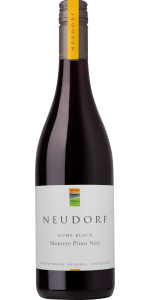
Description
Classically rich with dark chocolate notes, layered with coffee, cigar smoke and soft, old leather. Something of a prohibition bar in the 20’s. But there is an elegance here that is truly graceful, a balance of dark fruit, fine tannin and subtle oak.
For such a refined wine, you can rebel it up with food... dark enough for BBQ’d venison, earthy enough for wild mushrooms, intelligent enough to have on its own, in the cool of the evening, next to a roaring fire.
Certifications
Alcohol
13.5%
Analytical data
dry
Vineyard
It’s all about place. And we believe our place is special. We see and celebrate a “moutereness” in our wines.
Nelson’s Moutere Hills are sited in the centre of the northern tip of the South Island of New Zealand. Mountain ranges to the east, south and west provide a rain shadow effect, while Tasman Bay to the north ensures a maritime climate.
Our home plantings spill down a gentle north-facing slope overlooking a side branch of the Moutere Valley. The valley floor is home to hop gardens, orchards, berry farms and new vineyards.
Nelson often has the highest sunshine hours in the country; summer growing months are warm and relatively dry, with the possibility of rain increasing towards Autumn. Night temperatures cool markedly towards vintage, but damaging frosts are rare.
Coordinates: 41°14’S, 173°E Altitude: 25-110m Heat degree days: 1147 Annual sunshine hours: 2430 Annual rainfall: 962mm Max Jan daily temperature: 22°C Harvest: mid March – mid April
Soils
Great wines can only come from healthy soils. Healthy soil is our greatest vineyard asset. And it needs constant care.
Our vines are planted in deep clay gravel soils, laid down by ancient, long melted glaciers. These kaolinitic clay soils have a naturally low fertility and a sandy loam topsoil with an ever expanding organic matter content. They have a great water holding capacity which allows us to dry farm our vines through the sunny Nelson summer. We compost our grape skins and seeds and return them back to the vineyard floor to boost soil biodiversity and complete the nutrient cycle.
We have planted our vineyards on selected north facing slopes, embracing the “warm site in a cool climate” effect. These slopes also act as frost protection, draining cold air from the vineyard down to the valley floor.
Worms are the unseen workhorses in our vineyard, scavenging organic matter such as leaves and grass and breaking it down, aerating the soil as they go. Their excrement feeds an army of soil microbes which continue the good work, producing nutrients suitable for the vine to use, building up soil structure and keeping harmful pathogens at bay.
Mycorrhizal fungi on the vine roots hugely increase the vine’s ability to pick up these nutrients (and water), and in return they get to feed on sugars produced by the vine. We just love that symbiosis.
To keep these organisms working we need to maintain good levels of organic matter in the soil. Here at Neudorf, soil organic matter is enhanced by the presence of a permanent inter-row sward, mulched prunings and the return of composted winery waste.
Inter row herbs and grasses provide plant and insect species diversity, reduce plant vigour and contribute organic matter to the soil.
To quote soil ecologist Dr Emmanuel Bourguignon when he visited some years back ..“I have always loved your wines … and now I can see why”. This comment was made while he inspected the roots down at four metres.
Vinification
Wild Ferment, natural spring malo, barrel matured (18% new), unfined, unfiltered.
Maturation
11 months in oak, blended to stainless steel tank for 4 months.


